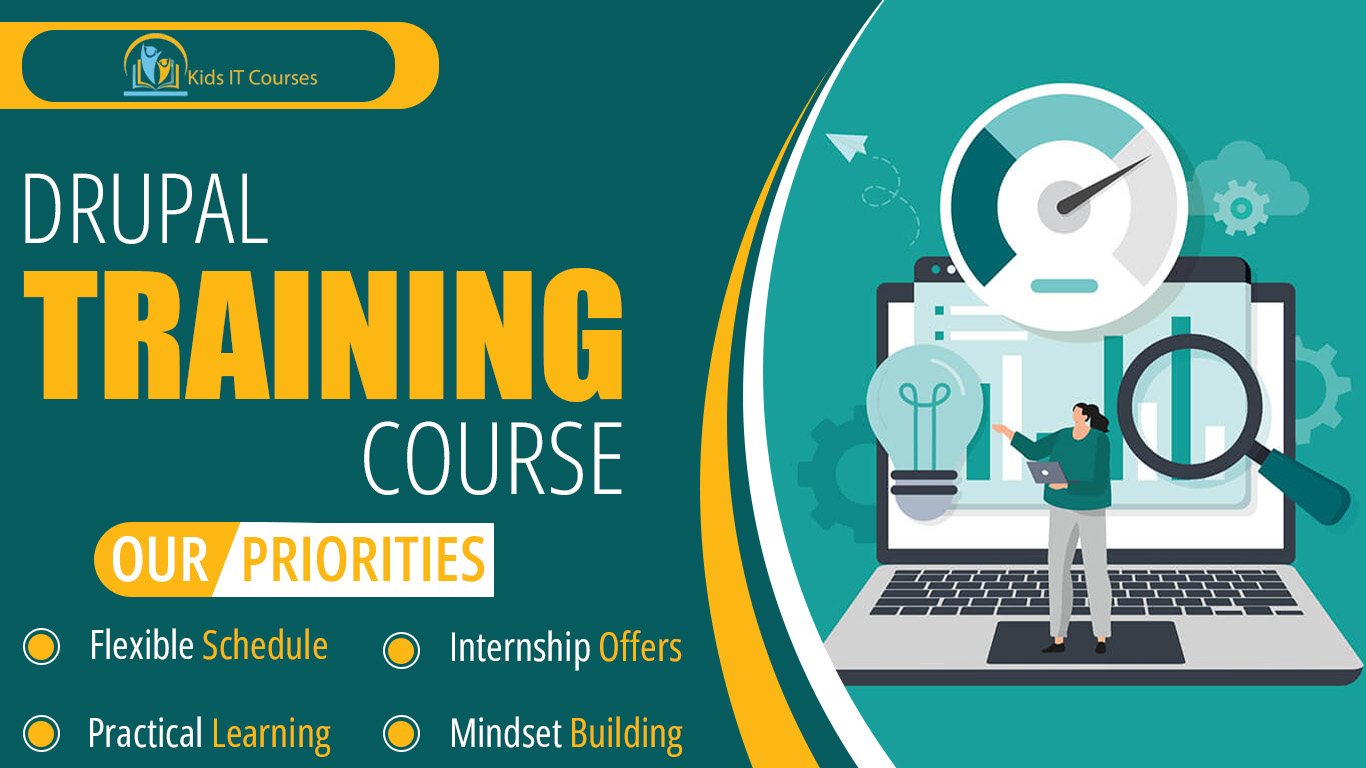
Drupal Course for Kids
Definition
• Drupal helps build websites. Kids create cool web pages.
• It uses blocks and tools. To build things easily.
• Kids learn to add content. Like pictures and stories.
• They organize websites well. Make pages neat and fast.
• Kids fix small problems. Keep websites working smooth.
• It teaches coding basics. And website design skills.
• Prepares kids for web jobs. Building sites is a fun skill.
Drupal Training | Computer Short Courses nearby Rawalpindi
Importance
• Drupal helps build websites. Kids learn to create pages.
• It is easy to use. With blocks and modules.
• Kids can manage content. Add text, pictures, and more.
• It teaches teamwork. Many people work together.
• Kids learn problem solving. Fixing website issues fast.
• It builds coding skills. For making better sites.
• Prepares kids for future. Tech jobs and projects.
Advantages for Freelancing
• Kids learn to build websites. Drupal makes it easy and fun.
• They can add pictures. And make pages look nice.
• Kids learn teamwork. Work on websites together.
• They use ready-made tools. No need to start from zero.
• Kids can change designs. Make sites look their way.
• Learn how to manage content. Add and edit text anytime.
• Builds problem-solving skills. Helps in future tech jobs.
Session 1 : Introduction to Drupal
What is Drupal and why it’s great for content-heavy websites
Real-life example: Government portals, university websites, news platforms (Drupal in action)
Understanding how Drupal manages content with modules and themes
Installing Drupal locally or on a web host
Activity: Explore the Drupal admin panel and create your first basic page
Session 2 : Content Management in Drupal
What is content management and how Drupal handles it differently
Real-life example: Organizing news articles into categories (nodes and content types)
Creating and editing content using content types
Using taxonomy to categorize and tag content
Activity: Create blog and news content types with categories
Session 3 : Drupal Themes and Layouts
What are themes and how they control the look of your site
Real-life example: Changing the design of your school website (themes)
Installing and customizing Drupal themes
Using layout builder to create page structures visually
Activity: Apply a new theme and create a custom homepage layout
Session 4 : Working with Modules
What are modules and why they’re the heart of Drupal’s flexibility
Real-life example: Adding features like contact forms or SEO tools (with modules)
Installing and enabling contributed modules
Must-have modules: Views, Pathauto, Webform, and CKEditor
Activity: Add a contact form and enable SEO-friendly URLs
Session 5 : Users, Roles, and Permissions
How to manage users and their access levels in Drupal
Real-life example: Giving editors access to write but not publish content (permissions)
Creating roles like Admin, Editor, Viewer
Assigning permissions for each user type
Activity: Create users with different roles and test their access
Session 6 : Creating Views in Drupal
What is Views and why it’s one of the most powerful tools in Drupal
Real-life example: Displaying a list of articles filtered by category
Creating custom views for pages, blocks, and feeds
Adding filters, sorting, and formatting output
Activity: Build a “Latest Articles” block and display it on your homepage
Session 7 : Drupal SEO and Performance Optimization
Best practices for making your Drupal site search-engine friendly
Real-life example: Getting your online magazine found on Google
Using SEO modules like Metatag and XML Sitemap
Optimizing site performance with caching and image compression
Activity: Add meta descriptions and enable caching settings
Session 8 : Final Project – Build a Complete Drupal Website
Plan and build a full-featured Drupal website with content types, users, views, and design
Implement SEO, permissions, and user interactions
Prepare the site for real-world launch with optimization
Activity: Present your final Drupal project with all key features
Bonus Materials
Drupal admin cheat sheet
List of essential contributed modules
Interactive quizzes to reinforce learning
Practice challenges for views, permissions, and layouts
Certificate of Completion for Drupal Fundamentals
